Relaxing the house rules: Opening up arts and sports to those with special needs in S’pore
Sign up now: Get ST's newsletters delivered to your inbox
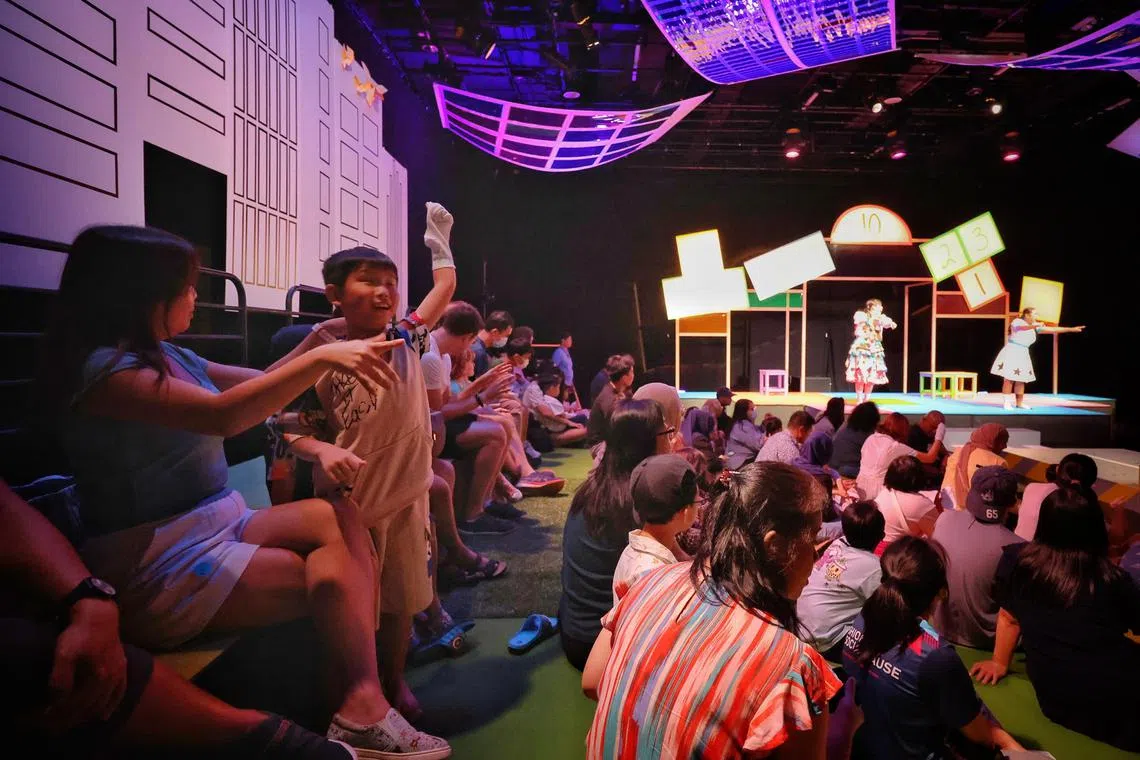
Ms Deng Anqi and her son, Javan Lee, who has autism, watching Fatimah And Her Magic Socks at the Esplanade on March 9.
ST PHOTO: JASON QUAH
Follow topic:
SINGAPORE – On the rare occasion that Ms Deng Anqi takes her son to the cinema, she braces herself for strangers shushing and staring at him and telling her off.
Her nine-year-old boy, Javan Lee, who has autism, cannot sit still or keep quiet for the whole movie, and she often has to take him out for a breather.
But at one theatre performance in March, no one batted an eyelid when Javan got up and danced, nor when he shouted answers to the actors’ questions.
In fact, joining in was encouraged during PLAYtime! Fatimah and Her Magic Socks, an interactive show at the Esplanade that caters to those with autism. Esplanade presented its first sensory-friendly performance in 2016 to cater to autistic children, against the perception that the theatre is a space that needs to be quiet and full of “house rules”.
Arts centres in Singapore have made strides in inclusion in recent years, setting aside sessions to cater to different needs.
Ms Gina Koh, co-chair of the Esplanade’s Accessibility Taskforce, said the arts centre targets to have one or more of such accessibility features for performances by its in-house programming team by 2027.
In 2021, the Esplanade introduced ticket concessions for people with disabilities and their companions. Ms Koh said there was a 33 per cent increase in take-up rate for the ticket concessions from 2022 to 2023.
It began piloting Relaxed Environment performances in 2022, including the free concert series Beautiful Sunday, held once a month.
Such performances allow members of the audience to make noise, leave and return to their seats as the shows are going on. For Relaxed Performances like children’s theatre series PLAYtime!, special modifications include keeping sounds at a consistent level to cater to children who have autism or sensory sensitivities.
Ms Deng, who is 39 and an engagement manager, said: “When I take Javan to shows that have stricter rules, he likes to move around and speaks pretty loudly. It makes me feel very stressed because there will be people looking at us like: ‘Why is he behaving like that? Why can’t I stop him?’”
But this show was different.
“He likes people to talk to him, so he will answer the actors’ questions. He has the space to move and dance around. He’s smiling, talking all the way and following the show. I’m also enjoying myself.”
Ms Deng added: “There are so many things that can catch his attention. Usually, his attention span will be probably 10 minutes, but he can last (through the 45-minute show).”
To prepare the children for what to expect, parents can download a pre-event guide that shows directions to the venue, the characters, and what the space will look like.
A calm space set up outside the theatre has earmuffs and fidget toys for those who need a break.

Ms Deng Anqi and her son, Javan Lee, during a performance of Fatimah And Her Magic Socks, an interactive show at the Esplanade that caters to those with autism.
ST PHOTO: JASON QUAH
Unsteady on feet but she learnt to dance
Ms Mary Tan, 25, could not walk till she was 3½ years old because of her different foot structure and weak muscle tone due to global developmental delay.
After graduating from Delta Senior School, she tried working as a packer in a bakery and as a cafe server but quit as the work was too demanding. Her mother, Madam Teresa Wong, 61, then started a home bakery to keep her busy.
But it was not until Ms Tan attended a puppetry class by non-profit organisation ART:DIS and a modern dance class in 2021 called RJKidz that she found her spark.
“It’s really not easy, but she likes it. So a lot of things that she could not do, now she can do,” said Madam Wong, who runs her home baking business full time.
Ms Tan now bakes, dances and learns puppetry every week, and has joined at least six performances, including one where she was paid as part of a cast with theatre company Gateway Arts.
In March, Ms Tan wielded villager, swordfish, bird and firefly puppets for the play alongside professional actors, together with five other puppeteers with special needs.
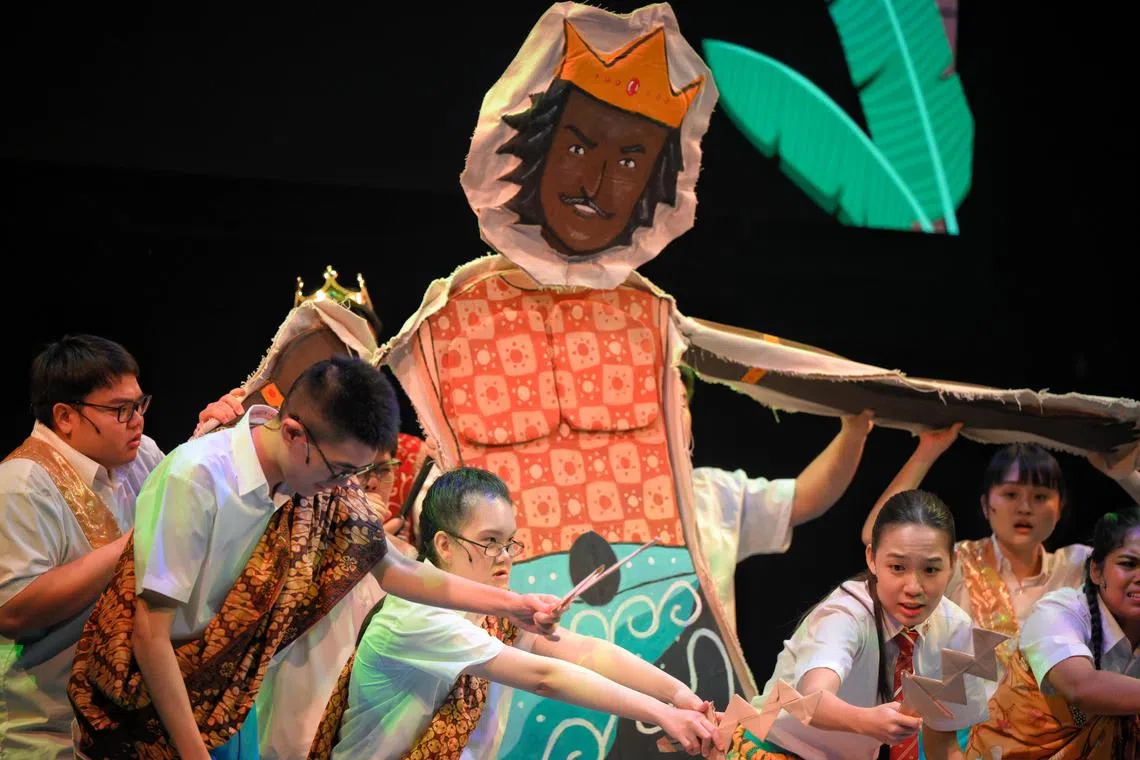
Ms Mary Tan (centre), 25, was part of a performance called SmartyPants And The Swordfish.
ST PHOTO: MARK CHEONG
The performance she was part of, called SmartyPants And The Swordfish, marks the first collaboration between ART:DIS Singapore and Gateway Arts.
The play included a relaxed sensory- and wheelchair-friendly setting, as well as creative captioning for the deaf, where text projected near the stage transcribed auditory elements of the show into English.
The visually impaired had tours to be familiarised with the space via touch before the show, and creative audio description, where someone verbally described the performance live to them through earphones.
On how she felt about her performance, Ms Tan said: “I did a really good job.”
Madam Wong said the performing arts training has helped her daughter.
“The meltdowns, her emotional control, have improved tremendously and I find she’s a much happier child,” she said.
“So when she makes mistakes, it’s easier to correct her; she’s so much more receptive.”
Ms Tan has learnt to take the train and bus to Gateway Theatre in Bukit Merah by herself for rehearsals.
From having a bad hunchback, she now walks more steadily, does not fall as often, and has learnt movements like straightening and bending, which she could not manage previously.
Her physiotherapist, whom she sees every two months to improve her muscle tone, recently said she could stop the sessions due to her progress.
Ms Tan faced every performance head on, although the unpredictable audience interaction segment made her anxious. To stay calm, she dabbed from her pouch of essential oils.

The play SmartyPants And The Swordfish included a sensory- and wheelchair-friendly relaxed setting, as well as creative captioning for the deaf, where text projected near the stage transcribes auditory elements of the show into English.
ST PHOTO: MARK CHEONG
With each performance, she became more confident and less stressed, said Madam Wong.
Teachers and cast members guided her on how to react to the audience and encouraged her after a good show.
“The special needs kids know that they have people there to support them to perform the whole thing. I think that works very well.”
Finding a community in theatre
In 2021, Mr Prithviraj “PJ” Kumar Basu, 26, chanced upon the Inclusive Young Company (iYC), an acting programme for young people with disabilities aged 16 to 35. It was a natural fit for the aspiring actor, who picked up acting at the age of 14 in school.
He now acts in plays as part of the programme with Singapore Theatre Company (STC), and works front of house for the company’s plays. This is his first job.
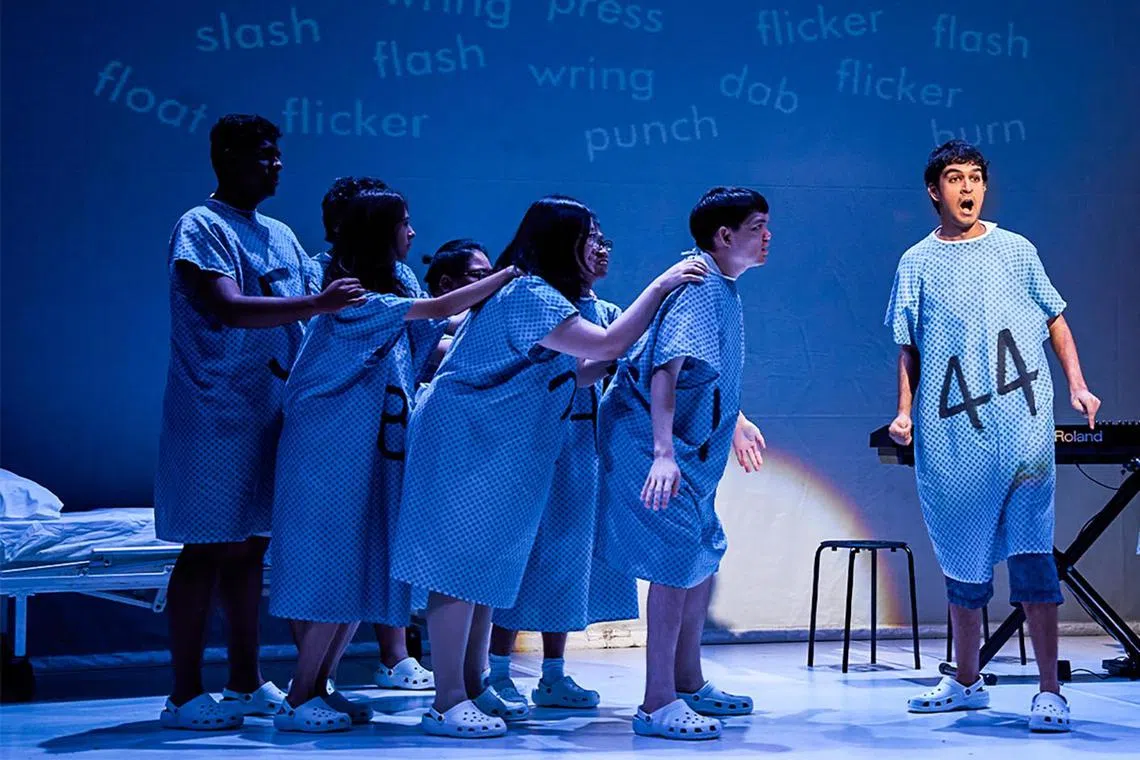
Mr Prithviraj “PJ” Kumar Basu (far right) in Open The Curtains, a play by the Singapore Theatre Company’s Inclusive Young Company programme in October 2023.
PHOTO: SINGAPORE THEATRE COMPANY
Mr Prithviraj, who has mild autism, is among the 11 members of the inclusive acting programme launched in 2020.
He said Ms Grace Lee-Khoo, artist and founder of Access Path Productions, who leads iYC, made it a warm and welcoming environment, unlike in high school theatre where students got yelled at when they made mistakes.
The biggest draw for him was the friendships made.
Mr Prithviraj said a bad fallout with a friend in school previously over a misunderstanding had shattered his confidence in relating to others.
He would get jealous looking at social media and imagine himself in photos with his schoolmates.
The theatre programme helped him to see he was not alone. “There are other people going through what I’m going through and they’re all wanting community as much as I do.”
From being terrified of how people would react to him, he now asks his new friends out for a meal without thinking twice.
He also lends a hand to others in the group with visual impairment and other needs.
He and six others will be professionally mentored in pursuing theatre by Ms Lee-Khoo and STC’s deputy artistic director, as well as receive guidance from a drama therapist on managing anxiety and relating to others.
Access to sports
Singapore is also working towards more accessible sports facilities and activities, with plans for all ActiveSG gyms to be inclusive by 2026.
Sport Singapore (SportSG) aims to have Hur machines – which are used for seniors and rehabilitation – in all ActiveSG gyms by then. Eight ActiveSG pools, including in Pasir Ris and Sengkang, also have ramps and hoists for wheelchair users.
The sports participation rate among people with disabilities rose from 28 per cent in 2015 to 54 per cent in 2022.
Since 2016, SportSG has introduced a range of disability sports programmes that have engaged nearly 20,000 people with disabilities to date.
One of them is Mr Danial Bawthan, 30, who was diagnosed with muscular dystrophy, which causes progressive weakness and loss of muscle mass, at the age of four.
He hits the gym twice a week, once for strength and conditioning with his wheelchair rugby team, and another time to train on his own.
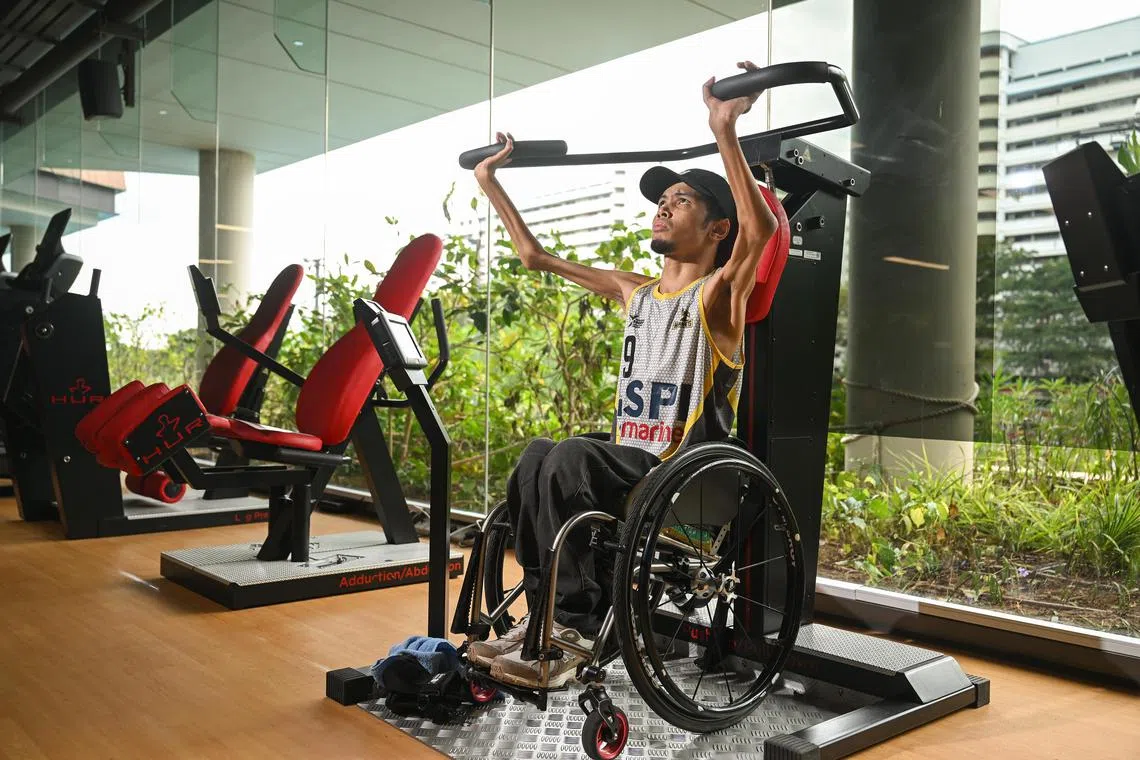
Mr Danial Bawthan, a wheelchair rugby athlete and music producer, at Bukit Canberra ActiveSG gym on March 28.
ST PHOTO: AZMI ATHNI
When he first set foot in the gym for training, he needed his family’s help to get on the equipment.
In 2018, the ActiveSG gyms brought in Hur machines, which had removable benches for wheelchair users. Mr Danial could then go to the gym himself, and soon got into a routine, working on exercises for his chest, back, arms and shoulders.
The Hur machines allow for small incremental increases of weight of 100g, so that progress is easier and gentler on the joints compared with traditional gym equipment.
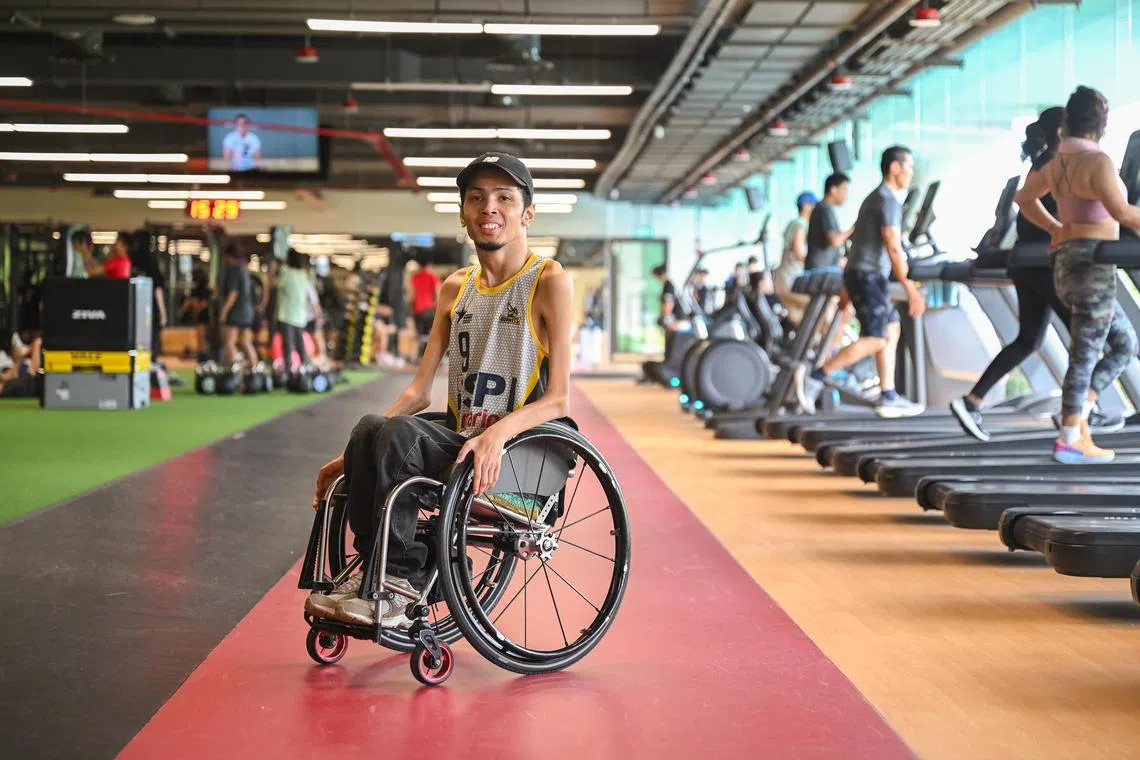
Mr Danial said he feels no different from others in the gym who are exercising to build their strength.
ST PHOTO: AZMI ATHNI
Mr Danial said he feels no different from others in the gym who are exercising to build their strength. “Everybody is here for that reason. It’s a sense of belonging.”
He said training is also a “mind game” for him.
“With my condition, my muscles will never grow big. I can never develop them to have that perfect symmetrical figure.
“And then I question myself: Do I want to look good or do I want to feel and be good?”
On what drives him, he said: “It is my responsibility to upkeep myself, to make sure that the body that I have is well maintained so that I can have quality of life later on.”
Mr Danial, a rapper and music producer with the stage name Wheelsmith, has represented Singapore in a music festival and wheelchair rugby competitions.
He taught himself to write and produce music when he was in Secondary 2, buying a keyboard, a laptop and a microphone. “I wasn’t very happy with who I am, how I look, and it was very bleak.”
When he was 25, he released Vanilla, his debut single.
On what he hopes to do for the disabled community, he said: “It doesn’t make sense if someone is in a wheelchair and says ‘I want to be like Michael Jackson’. I hope they will look at me and say, ‘I want to be like him’.”
Scaling new heights with a little help
Balancing is challenging for Bravienne Wee, who has cerebral palsy on her right side and hearing impairment. She wears an ankle foot orthosis, a supportive device to stabilise her joints.
In 2023, the 15-year-old senior student at Cerebral Palsy Alliance Singapore (CPAS) faced her fears at Republic Polytechnic’s new disability-friendly outdoor adventure facility, the Xperiential Learning Centre.
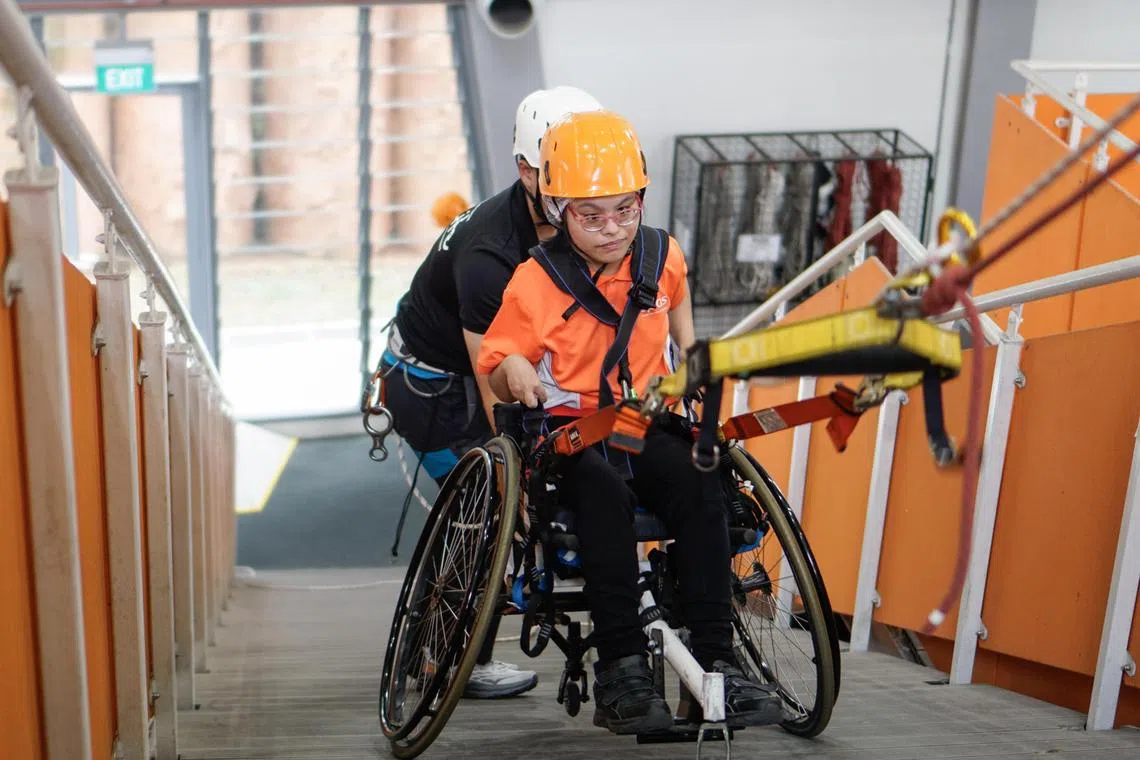
CPAS student Bravienne Wee, 15, trying out the abseiling facility at Republic Polytechnic’s Xperiential Learning Centre.
PHOTO: REPUBLIC POLYTECHNIC
The centre welcomes wheelchair users – it has a manual lift system to aid their ascent and descent on facilities such as the rollglider, the high challenge course and abseiling.
In a three-year outdoor learning programme set up by CPAS and the polytechnic, around 20 students from CPAS go to the facility at least once a year.
The programme also allows CPAS students to experience outdoor activities such as kayaking and camping, as well as an overseas service learning trip during the final year.
Rock climbing was daunting for Bravienne, who can use only her left arm and is unstable on her right foot.
The rock wall has varying difficulty levels to cater to individuals with different abilities. Those with lower mobility or upper-body strength can use the inclined portion of the wall, which is easier to climb.
They will be manually belayed, although there is also an auto-belay system. This allows the belayer to pull the participant up slowly if the person needs help and he can also take a break in between as the belayer will be supporting their weight.
The tiles can also be changed to larger ones that are easier to grip and stand on.
“I’m proud of myself because I overcame my fears,” said Bravienne, who is part of her school’s Scouts co-curricular activity.
Ms Aifaa Liyana Norazhar, CPAS teacher-in-charge of Scouts and outdoor learning, said Bravienne pushed herself to climb to the top.
Gaining outdoor learning exposure also pushes Bravienne to try new things, said Ms Aifaa. “There’s always an element of fear in the beginning, but then she’s always willing to try.”
Editor’s note: This story has been edited for clarity.


